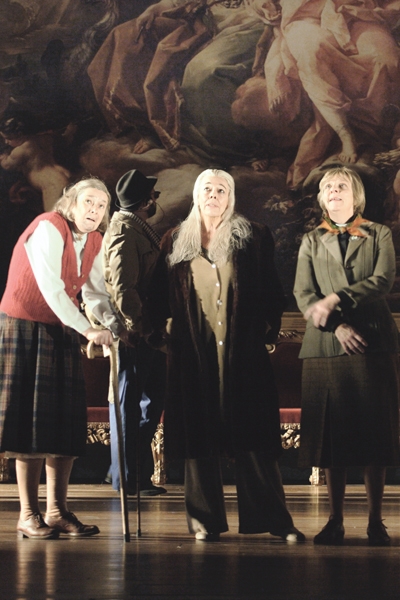An orgy of navel-gazing on the South Bank where a national treasure is satirising the National Trust at the National Theatre. Alan Bennett sets his latest comedy in the drawing room of a crumbling Georgian mansion in South Yorkshire. Greedy speculators are queuing up to seize the house from its plucky owner, Lady Dorothy Stacpoole, a high-born hippie who spent her youth going to parties and modelling. Now aged 80 or 90, she’s ill equipped to outwit the circling vultures.
Bennett is good at creating warm, believable women but with Lady Dorothy he simply regurgitates a stale theatrical burp: the beatnik with a bus pass. Writing plots has never been his strong point and he unwisely stuffs his story with fistfuls of loose threads. They poke out all over the place. Former lovers appear from nowhere. The sale of priceless treasures may, or may not, save Lady Dorothy from destitution. The estate is about to sink into a disused mine-works. Or possibly it isn’t. A shadowy outfit known as ‘the Concern’ wants to buy the mansion and rebuild it, brick by brick, in Devon. Is that a dig at Yorkshire’s climate? Hard to say. There are lots of bad-taste gags about chamber pots containing the vestigial faeces of Bernard Shaw, Ramsay MacDonald and other dead notorieties. Not believable or funny.
Bennett is at his happiest when teasing the National Trust very, very gently. He calls it a secular faith whose sacramental nutriments are coffee and walnut cake. And he highlights a genuine concern when he says the Trust must balance its portfolio of Gothic masterpieces with more popular shrines like ‘Cilla Black’s childhood home’, or, ‘the last functioning children’s library in the north-east’. These are the only really toothy jokes. The second half is dominated by cheap ribaldry. Lady Dorothy leases the estate to a porn director who films a bit of tame erotica on a four-poster bed. Enter a bishop. He appears bemused rather than indignant, and he accepts the explanation that he’s witnessing the Women’s Institute calendar being photographed. This mirthless gag crystallises Bennett’s difficulty. He writes for a world where sexual repression is normal, but he lives in a world where it scarcely exists: even the WI makes soft porn. Lady Dorothy’s lesbian sister gets caught in the same contradiction when she expresses disgust at a copy of Hustler. But a lesbian would be the last person to object to female nudity.
The play’s message is that the National Trust is a noble movement marred by its flocks of brain-dead, culture-gobbling members. But Bennett also reveals that his unofficial role as ‘establishment satirist’ is as nonsensical as a vegetarian shark-burger or a Buckingham Palace republican appointed by the Queen. We wouldn’t commission Bennett to catch a giraffe in a butterfly net — which is what this play looks like — so we should spare him the ordeal of dismembering institutional formations which he clearly cherishes and adores.
Blackta at the Young Vic is a new play about black actors by Nathaniel Martello-White. It’s one of the toughest shows I’ve ever had to review because a description of its contents will make any sane play-goer run a mile. But here goes. The idiom is oblique. The writing is heavily influenced by Beckett’s bleak absurdism. The cast are named after their superficial characteristics: Brown, Yellow, Black, Older Black, Younger Black. They occupy a hellish underworld where they compete for acting roles by performing idiotic mimes before a panel of faceless impresarios. Coloured lights deliver verdicts on each routine. Red means rejection. Green, acceptance. Amber, equivocation. Logic plays no part in these decisions.
The nervy, foul-mouthed actors are openly frank about racial distinctions. They discuss the straightness of their noses, the thickness of their lips and the darkness of their skins, and they acknowledge that these immutable qualities determine their value to the unseen producers. White actors (called ‘pale boys’ or ‘floppy-heads’) usually get the best roles but occasionally a black actor succeeds and is rewarded with fame and riches.
The play has many glories, not least its searing rhetoric, its unflinching honesty and its moments of sublime physical comedy. Above all, it transcends the limitations I’ve set out here. This is not a parable of the acting profession or of some crushed racial minority. It’s a story of everyday ambition, of life in the urban rat race, of perseverance triumphing over adversity. And it contains perhaps the finest, and funniest, speech about slavery I’ve heard.
The cast, brilliantly drilled by director David Lan, are exhilarating to watch and Javone Prince stands out as a hopeless and hilarious dissembler. One warning: the show runs for two hours, without an interval, and the Young Vic’s seats are buttock-crimpingly hard. But it’s worth the pain.







Comments